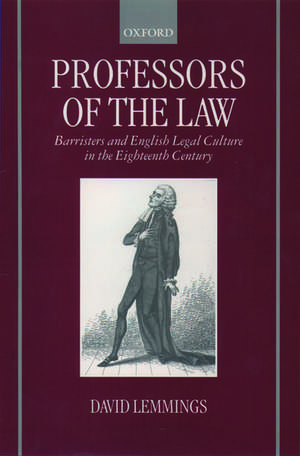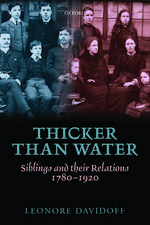Professors of the Law: Barristers and English Legal Culture in the Eighteenth Century
Autor David Lemmingsen Limba Engleză Hardback – 11 mai 2000
Preț: 1349.83 lei
Preț vechi: 2050.35 lei
-34% Nou
Puncte Express: 2025
Preț estimativ în valută:
258.37€ • 280.74$ • 217.17£
258.37€ • 280.74$ • 217.17£
Carte tipărită la comandă
Livrare economică 09-15 aprilie
Preluare comenzi: 021 569.72.76
Specificații
ISBN-13: 9780198207214
ISBN-10: 0198207212
Pagini: 414
Ilustrații: 8 black and white illustrations
Dimensiuni: 163 x 242 x 28 mm
Greutate: 0.76 kg
Editura: OUP OXFORD
Colecția OUP Oxford
Locul publicării:Oxford, United Kingdom
ISBN-10: 0198207212
Pagini: 414
Ilustrații: 8 black and white illustrations
Dimensiuni: 163 x 242 x 28 mm
Greutate: 0.76 kg
Editura: OUP OXFORD
Colecția OUP Oxford
Locul publicării:Oxford, United Kingdom
Recenzii
Given the performance of the task taken up here, and given the analytic results, we can only applaud David Lemmings for the accomplishment.
This is a book thick with description, layer upon layer drawn not only from the usual sources for the study of the profession - court records, papers in the Inns of Court - but also from an amazing number of personal archives scattered from Aberystwyth to Maidstone and from Cumbria to Exeter. Examples culled from letters and diaries put meat on the bones of statistical analyses plotting the decline of admissions to the Inns and the rise of barristers' fees. Lemmings does more than chart the decay of a profession; he lets us hear what this meant to lawyers who succeeded nonetheless, and more often, to those who did not.
With the marvellous possibilities of legal history in mind, it would be a shame if so-called legal historians were the only readers of David Lemming's book. For his exhaustive treatment of the world of barristers should shake up eighteenth-century studies, flying hard as it does in the face of continuing fascination with the seeming modernity of that century.
Particularly strong on the working life of the bar both in the central courts at Westminster and in the provinces and colonies ... Unusually for a scholarly work Professors of the Law, is at least in places, also a 'very good read'. Andrew Hudleston's fatherly worries about his wastrel son and Charles Pratt's letters to his fiancée help to give the material a life that it would otherwise lack ... Dr Lemmings has written an excellent book on the history of the legal profession.
Dr Lemmings has written an interesting and important book on the culture of English law during a critical period ... Certainly historians of the legal profession will find this book extremely rewarding. Moreover, it will provide scholars interested in the growth of practical parliamentary supremacy with a stimulating twist to a familiar story.
Historians of the long eighteenth century, and of the legal profession, are strongly encouraged to read it.
Professors of the Law is a superb achievement, an example of the highest quality of legal-historical research and writing. Based on an impressive array of manuscript and published sources and written with clarity and style, the book contains insights, elegantly expressed, on nearly every page.
Lemmings paints a detailed, interesting, yet most unflattering picture of eighteenth-century English barristers ... all those seriously interested in English constitutional and legal history should welcome it.
Meaty study ... Professors of the Law is a treasure trove of new analysis and information about the working lives and cultural impact of barristers in the long eighteenth century.
This is a book thick with description, layer upon layer drawn not only from the usual sources for the study of the profession - court records, papers in the Inns of Court - but also from an amazing number of personal archives scattered from Aberystwyth to Maidstone and from Cumbria to Exeter. Examples culled from letters and diaries put meat on the bones of statistical analyses plotting the decline of admissions to the Inns and the rise of barristers' fees. Lemmings does more than chart the decay of a profession; he lets us hear what this meant to lawyers who succeeded nonetheless, and more often, to those who did not.
With the marvellous possibilities of legal history in mind, it would be a shame if so-called legal historians were the only readers of David Lemming's book. For his exhaustive treatment of the world of barristers should shake up eighteenth-century studies, flying hard as it does in the face of continuing fascination with the seeming modernity of that century.
Particularly strong on the working life of the bar both in the central courts at Westminster and in the provinces and colonies ... Unusually for a scholarly work Professors of the Law, is at least in places, also a 'very good read'. Andrew Hudleston's fatherly worries about his wastrel son and Charles Pratt's letters to his fiancée help to give the material a life that it would otherwise lack ... Dr Lemmings has written an excellent book on the history of the legal profession.
Dr Lemmings has written an interesting and important book on the culture of English law during a critical period ... Certainly historians of the legal profession will find this book extremely rewarding. Moreover, it will provide scholars interested in the growth of practical parliamentary supremacy with a stimulating twist to a familiar story.
Historians of the long eighteenth century, and of the legal profession, are strongly encouraged to read it.
Professors of the Law is a superb achievement, an example of the highest quality of legal-historical research and writing. Based on an impressive array of manuscript and published sources and written with clarity and style, the book contains insights, elegantly expressed, on nearly every page.
Lemmings paints a detailed, interesting, yet most unflattering picture of eighteenth-century English barristers ... all those seriously interested in English constitutional and legal history should welcome it.
Meaty study ... Professors of the Law is a treasure trove of new analysis and information about the working lives and cultural impact of barristers in the long eighteenth century.












